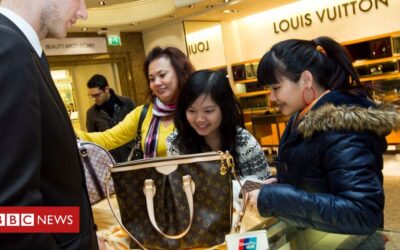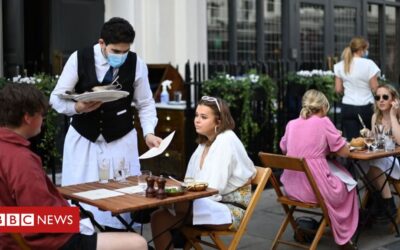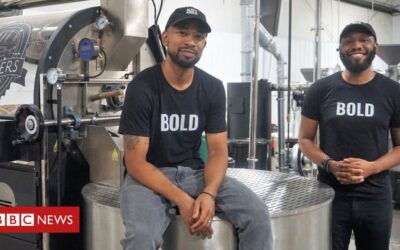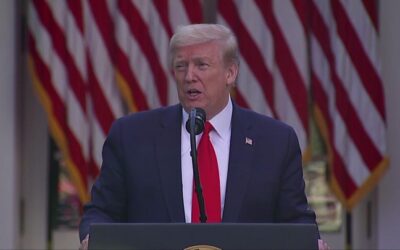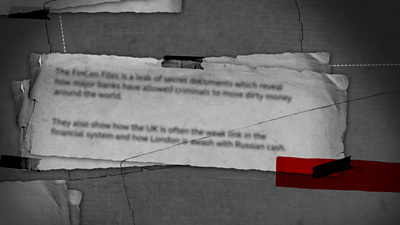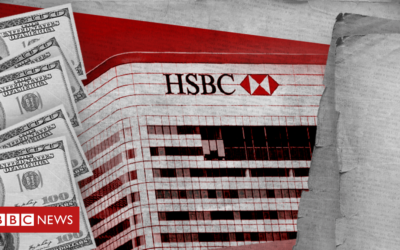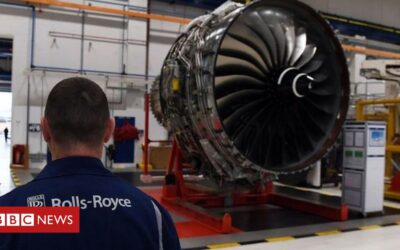When Aston Martin unveiled the Bulldog 40 years ago it quickly became the stuff of legend for car fans.Only one was ever built and its futuristic design and high-performance engine helped it become the fastest car on the road when it reached a record-breaking 192mph (308km/h).But in 1981, Aston Martin needed to raise cash and was forced to sell the Bulldog to a buyer in the Middle East and the car disappeared from view, ending up being moved around storage units.Now the son of the former head of Aston Martin has tracked it down and thanks to a wealthy American Bulldog fan, it’s been bought and is being restored by classic car specialists in Shropshire. Correspondent: Phil Mackie; Camera: Steve Lammiman; Online editor: Catherine Mackie
BBC Business News Articles
Ending VAT-free shopping 'will hit UK tourism and retail'
A government plan to end VAT-free shopping for international visitors at the end of the year could cost the UK billions of pounds in lost income, travel and retail bosses have warned. In a letter to the chancellor, the heads of firms such as Marks & Spencer, Heathrow and Selfridges said the move also put 70,000 jobs at risk.About £3.5bn in tax-free sales are made to non-EU tourists each year.The Treasury says the tax relief is costly and vulnerable to fraud.Under the VAT Retail Export Scheme (VAT RES), international visitors to the UK can reclaim the VAT they pay on goods purchased but not consumed in the UK. It benefits tourist hotspots like London and Edinburgh, as well as the famous Bicester shopping village in Oxfordshire, which attracts visitors seeking bargains.But earlier this month the government said it would abolish VAT RES on 31 December, when the Brexit transition period ends, arguing it offered little benefit to many parts of the UK and was inconsistent with international norms. UK ‘could lose £60m a day’ as tourism slumps
Chinese visitor slump hits Bicester Village
Critics say the Treasury fears that, under World Trade Organisation rules, the UK would also have had to extend the scheme to EU visitors after the transition period, creating an overwhelming administrative burden on the tax authorities.The Association of International Retail (AIR), which co-wrote the letter, urged the chancellor to “look again at this devastating decision”. It warned the UK will become the only European country not to offer VAT-free shopping for international visitors. This would hurt the tourism, retail and leisure industries at a time when they are “already reeling from the impact of Covid-19″”Madrid, Milan and Paris are rubbing their hands with glee at this self-inflicted wound,” said AIR boss Paul Barnes. “If we charge a fifth more for the same goods, international visitors will not hesitate to switch their city breaks to other countries, and the stores and jobs will follow within months.”According to Visit Britain, international tourists spent £6bn on shopping in the UK in 2018. Of those transactions, £3.5bn were registered as tax free sales, although VAT was only reclaimed on £2.5bn.’Tremendous disadvantage’Thierry Andretta, boss of handbag maker of Mulberry which also signed the letter, accused the government of being “short-sighted”.”It will destroy the UK’s ability to remain competitive with Continental Europe and… place us at a tremendous disadvantage, not to mention have a material impact on jobs and manufacturing in this sector.”A Treasury spokesman said: “We’re making use of the end of the transition period to bring our personal duty and tax systems in line with international norms. “This was subject to a full consultation, and VAT-free shopping is still available because retailers are able to offer it to overseas visitors who purchase items in store and have them sent directly to their home addresses.”
Coronavirus: UK firms voluntarily return £215m in furlough cash
UK firms have voluntarily returned more than £215m to the government in furlough scheme payments they did not need or took in error. According to HMRC figures, some 80,433 employers have returned cash they were given to help cover workers’ salaries.The money returned is a tiny part of the £35.4bn claimed under the scheme up until 16 August, the latest date for which statistics are available. Officials believe £3.5bn may have been paid out in error or to fraudsters.HMRC said it welcomed employers who have voluntarily returned grants.Under the Coronavirus Job Retention Scheme (CJRS) – or furlough scheme – workers placed on leave have received 80% of their pay, up to a maximum of £2,500 a month.At first this was all paid for by the government, but firms are now having to make a contribution to wages as well.Ikea planning to repay furlough payments
Rightmove and Compass say no to job retention bonus
As of 15 September, companies and other bodies had returned £215,756,121 in grants, according to data obtained by the PA news agency through a freedom of information request.Some of the money was returned, while other firms simply claimed smaller payouts the next time they were given furlough cash.HMRC said: “HMRC welcomes those employers who have voluntarily returned CJRS grants to HMRC because they no longer need the grant, or have realised they’ve made errors and followed our guidance on putting things right.”The CJRS was launched in April to support businesses that could not operate, or had to cut staffing levels, during lockdown. But companies have been urged to repay the taxpayer cash they receive if they feel they can afford to do so.Choosing to repay Housebuilders Redrow, Barratt and Taylor Wimpey have both returned all the furlough money they have claimed. So too have Ikea, Games Workshop, distribution giant Bunzl and the Spectator magazine. Others such as Primark and John Lewis have said they will not claim money under the Jobs Retention Bonus, which pays firms £1,000 for every employee they bring back from furlough and keep employed until the end of January.The government has rejected calls to extend the furlough scheme when it ends on 31 October, despite warnings that it could trigger a wave of job cuts.HMRC said: “To tackle the impact the pandemic had on people’s jobs, businesses and livelihoods, the government introduced one of the most generous and comprehensive packages of support in the world, including the Coronavirus Job Retention Scheme.”So far, the Coronavirus Job Retention Scheme has helped 1.2 million employers across the UK furlough 9.6 million jobs, protecting people’s livelihoods.”
The black-owned coffee firm that became a bestseller
The BBC’s weekly The Boss series profiles different business leaders from around the world. This week we speak to Pernell Cezar and Rod Johnson, founders of US coffee and tea company Blk & Bold Speciality Beverages.Pernell Cezar jokes that if he and his business partner Rod Johnson ever fall out, he will phone Rod’s mother to ask her to tell him off.”If Rod gets too far out of line, I’ll just call his mom,” says Pernell. “Not too many business relationships where you get a chance to do that.”Pernell and Rod, both 33, are childhood friends who grew up on the same block in the blue-collar city of Gary, Indiana.Two years ago they set up a coffee and tea business together – Blk & Bold. Today it is believed to be the first nationally distributed black-owned coffee brand in the US.Helped by a growing interest in black-owned businesses as a result of the Black Lives Matter movement, Pernell and Rod have seen sales soar this year at stockists including retailers Target, Whole Foods and Amazon.Both passionate about coffee, the two friends decided to launch Blk & Bold in June 2018, after spending a decade in different industries. Rod was previously a professional fundraiser for schools, universities and hospitals, while Pernell had worked for Target.They started the business at Pernell’s home in Des Moines, Iowa, with the aim of not just selling quality coffee and tea, but also of doing good. They would donate some of their profits to charity.”The idea was to take the affinity for this daily ritual of coffee or tea drinking, and make it so that anyone could participate in the social impact model,” says Rod. “That’s at the core of what we do. We give 5% of our profits to organisations that support at-risk youth.”Pulling together their savings, the two former schoolmates bought a coffee roaster, and started production in Pernell’s garage.”It was a lot of hours in the garage, burning beans, having the neighbours call my wife to let her know that the garage might be on fire,” says Pernell. “It was a lot of trial and error that came with that.”The friends then attended 14 trade shows within eight months of launching the brand, and slowly built up a loyal client base.”We are self-funded, bootstrapped and profitable,” says Pernell.Selling direct to consumers from their website from day one, Pernell’s previous career in retail was a big help in securing the deals with supermarkets, and especially Target, his former employer.The company then got a massive promotional boost in April this year, when US singer Kelly Rowland offered her fans free Blk & Bold samples. In a Facebook post in support of her single Coffee, she enthused about the business.Pernell says the death of George Floyd in May, and the rise of the Black Lives Matter movement, then gave further exposure to black-owned businesses like theirs.”From our vantage point we have had a lot of jolts throughout the past few months,” says Pernell. “Individuals saying, ‘You know what? That’s an outlet that we can get behind.'”And we saw significant amounts of support for us, being the only nationally distributed, black-owned coffee brand. And individuals discovering us through that unfortunate event (the death of Mr Floyd).”The firm says that sales from its website in the second quarter of the year were almost 40 times higher than they were in the first quarter, and that it was a number one bestseller on Amazon in the US.At the start of September the business was given a further boost when it won the Social Entrepreneur of the Year award from black-owned business directory Official Black Wall Street in recognition of its charity donations.Victoria Ho, a Los Angeles-based consumer products brand expert, says that Blk & Bold’s commitment to social justice means it connects with younger customers.”They get an emotional and intellectual satisfaction from supporting this brand,” she says. “When they see a purpose-driven brand, that almost as a bonus is offering a product that they enjoy in their personal lifestyle, they get nourished in both ways.”More The Boss features:Rod says that the name Blk & Bold is intended to underline the company’s purpose. “It serves as a double entendre that speaks to, on the surface, our products – black coffee and tea with bold taste,” he says.”But it also describes us as men, entrepreneurs, and our approach to life. We are, and have always, embraced being both black and bold, our company is now an extension of that disposition.”To keep up with demand, the two friends recently moved into a new 10,000 sq ft (900 sq m) facility in Des Moines that will enable them to quadruple production.”Pernell and I have known each other almost two decades now,” says Rod. “Every time I say it, it still is a little unfathomable that I’ve known, and had such a deep relationship with, someone for so long. That’s why we work well together.”It has been a great journey so far, and I’m really looking forward to what comes down in perpetuity.”
WeChat: Judge blocks US attempts to ban downloads of Chinese app
A judge has blocked a US government attempt to ban the Chinese messaging and payments app, WeChat.US Magistrate Judge Laurel Beeler said the ban raised serious questions related to the constitution’s first amendment, guaranteeing free speech.The Department of Commerce had announced a bar on WeChat appearing in US app stores from Sunday, effectively shutting it down.The Trump administration has alleged it threatens national security.It says the app could pass user data to the Chinese government.Is the US about to split the internet?
What TikTokers make of Trump’s ban threat
Both WeChat and China have strongly denied the claim. Tencent, the conglomerate that owns WeChat, had previously described the US ban as “unfortunate”.The ruling comes just after TikTok, which was also named in the Department of Commerce order, reached a deal with US firms Oracle and Walmart to hopefully allow them to keep operating.What happened in court?The case came to court after a group of US WeChat users challenged President Donald Trump’s executive order that sought to shut WeChat down in the country.The US Justice Department argued that blocking the executive order would “frustrate and displace the president’s determination of how best to address threats to national security”. However Judge Beeler, sitting in San Francisco, noted that “while the general evidence about the threat to national security related to China (regarding technology and mobile technology) is considerable, the specific evidence about WeChat is modest”.Why does the US want the apps banned?In a statement, the US Department of Commerce Secretary Wilbur Ross said the decision to block the app was taken “to combat China’s malicious collection of American citizens’ personal data”.The department said WeChat collected “vast swathes of data from users, including network activity, location data, and browsing and search histories”.
Media playback is unsupported on your device
Friday’s statement from the commerce department said the governing Chinese Communist Party “has demonstrated the means and motives to use these apps to threaten the national security, foreign policy, and the economy of the US”.Tencent, which owns WeChat, has said that messages on its app are private.More than just an appWeChat is used by nearly 20 million people in the US – and pretty much exclusively by the Chinese and South East Asian diaspora. It is hard to describe how important it is in people’s lives. It is not just an app, for many people WeChat IS their mobile phone. It is like Amazon, Facebook, WhatsApp, Tinder and much more, rolled into one.One Malaysian expat told me she would “cry” if the app was blocked. She told me her family had spent time showing her elderly mother how to use WeChat – and worried she would be unable to communicate with her if the ban came into force. Interestingly though, we have not heard much from WeChat’s owners – Tencent. Why? Well, Tencent is one of the biggest games companies in the world – and has a huge market in America. If President Trump were to go further and target that section of the business it would really sting.What is WeChat?WeChat was set up in 2011. It is a multi-purpose app allowing users to send messages, make mobile payments and use local services. It has been described as an “app for everything” in China and has more than one billion monthly users. Like all Chinese social media platforms, WeChat must censor content the government deems illegal. In March, a report said WeChat was censoring key words about the coronavirus outbreak from as early as 1 January. But WeChat insists encryption means others cannot “snoop” on your messages, and that content such as text, audio and images are not stored on its servers – and are deleted once all intended recipients have read them.
FinCEN Files: What are Suspicious Activity Reports?
The FinCEN Files consist of more than 2,500 documents which were sent to US financial authorities reporting banks’ concerns about their clients.FinCEN is the US Financial Crimes Investigation Network.Concerns about transactions made in US dollars need to be sent to FinCEN, even if they took place outside the US.Suspicious activity reports, or SARs, are an example of how those concerns are recorded. A bank must fill in one of these reports if it is worried one of its clients might be up to no good. The report is sent to the authorities.The files were obtained by BuzzFeed News which shared them with the International Consortium of Investigative Journalists (ICIJ) and 400 journalists around the world. Panorama has led research for the BBC.HSBC moved Ponzi scheme millions despite warningAll you need to know about the FinCEN Files leak
FinCEN Files: HSBC moved Ponzi scheme millions despite warning
HSBC allowed fraudsters to transfer millions of dollars around the world even after it had learned of their scam, leaked secret files show.Britain’s biggest bank moved the money through its US business to HSBC accounts in Hong Kong in 2013 and 2014.Its role in the $80m (£62m) fraud is detailed in a leak of documents – banks’ “suspicious activity reports” – that have been called the FinCEN Files.HSBC says it has always met its legal duties on reporting such activity.The files show the investment scam, known as a Ponzi scheme, started soon after the bank was fined $1.9bn (£1.4bn) in the US over money laundering. It had promised to clamp down on these sorts of practices.Lawyers for duped investors say the bank should have acted sooner to close the fraudsters’ accounts.The documents leak includes a series of other revelations – such as the suggestion one of the biggest banks in the US may have helped a notorious mobster to move more than $1bn.What are the FinCEN Files?The FinCEN Files are a leak of 2,657 documents, at the heart of which are 2,100 suspicious activity reports, or SARs.SARs are not evidence of wrongdoing – banks send them to the authorities if they suspect customers could be up to no good.By law, they have to know who their clients are – it’s not enough to file SARs and keep taking dirty money from clients while expecting enforcers to deal with the problem. If they have evidence of criminal activity, they should stop moving the cash.The leak shows how money was laundered through some of the world’s biggest banks and how criminals used anonymous British companies to hide their money.The SARs were leaked to the Buzzfeed website and shared with the International Consortium of Investigative Journalists (ICIJ). Panorama led the research for the BBC as part of a global probe. The ICIJ led the reporting of the Panama Papers and Paradise Papers leaks – secret files detailing the offshore activities of the wealthy and the famous.Fergus Shiel, from the consortium, said the FinCEN Files are an “insight into what banks know about the vast flows of dirty money across the globe… [The] system that is meant to regulate the flows of tainted money is broken”.The leaked SARs had been submitted to the US Financial Crimes Investigation Network, or FinCEN between 2000 and 2017 and cover transactions worth about $2 trillion. FinCEN said the leak could impact US national security, risk investigations, and threaten the safety of those who file the reports.But last week it announced proposals to overhaul its anti-money laundering programmes.The UK also unveiled plans to reform its register of company information to clamp down on fraud and money laundering.All you need to know about FinCEN documents leakWhat was the Ponzi scam?The investment scam that HSBC was warned about was called WCM777. It led to the death of investor Reynaldo Pacheco, who was found under water on a wine estate in Napa, California, in April 2014.Police say he had been bludgeoned with rocks.He signed up to the scheme and was expected to recruit other investors. The promise was everyone would get rich.A woman Mr Pacheco, 44, introduced lost about $3,000. That led to the killing by men hired to kidnap him.”He literally was trying to… make people’s lives better, and he himself was scammed, and conned, and he unfortunately paid for it with his life,” said Sgt Chris Pacheco (no relation), one of the officers who investigated the killing.Reynaldo, he said, “was murdered for being a victim in a Ponzi scheme”.What did the scam promise?The scheme was started by Chinese national Ming Xu. Little is know about how he came to be living in the US, although he claims to have studied for an MA in California.Basing himself in the Los Angeles area, Xu – or “Dr Phil” as he styled himself – acted as a pastor at evangelical churches.Xu said he was operating a global investment bank, World Capital Market, that would pay out 100% profit in a 100 days. In reality, he was running the WCM777 Ponzi scheme.Through travelling seminars, Facebook and webinars on YouTube, it raised $80m selling supposed investment opportunities in cloud computing.Thousands of people from the Asian and Latino communities were taken in. The fraudsters used Christian imagery and targeted poor communities in the US, Colombia and Peru. There were also victims in other countries, including the UK.Regulators in California told HSBC it was investigating WCM777 as early as September 2013 – and alerted its residents to the fraud. And California, along with Colorado and Massachusetts, took action against WCM for selling unregistered investments.HSBC did spot suspicious transactions going through its systems. But it was not until April 2014, after US financial regulator the Securities and Exchange Commission filed charges, that the WCM777 accounts at HSBC in Hong Kong were shut.By that time there was nearly nothing left in them.What do the suspicious activity reports show?HSBC filed its first SAR about the scam on 29 October 2013 relating to more than $6m sent to the fraudsters’ accounts in Hong Kong.Bank officials said there was “no apparent economic, business, or lawful purpose” for the transactions – and noted allegations of “Ponzi scheme activities”. A second SAR in February 2014 identified $15.4m in suspicious transactions, and a “Potential Ponzi scheme”.A third report in March related to a company associated with WCM777 and nearly $9.2m, and noted the regulatory moves by US states and an investigation ordered by Colombia’s president.What did HSBC do?The WCM777 scheme emerged months after HSBC avoided a US criminal prosecution over money laundering by Mexican drug barons. It did so by agreeing to improve procedures.Analysis by the ICIJ shows that between 2011 and 2017 HSBC identified suspicious transactions moving through accounts in Hong Kong of more than $1.5bn – about $900m linked to overall criminal activity.But the reports failed to include key facts about customers, including the ultimate beneficial owners of accounts and where the money came from.Banks are not allowed to talk about suspicious activity reports.HSBC said: “Starting in 2012, HSBC embarked on a multi-year journey to overhaul its ability to combat financial crime across more than 60 jurisdictions… HSBC is a much safer institution than it was in 2012.”The bank added the US authorities had determined that it “met all of its obligations under the [agreement struck with US prosecutors]”.Xu was eventually arrested by the Chinese authorities in 2017 and jailed for three years over the scam.Speaking to the ICIJ from China, Xu said HSBC had not contacted him about his business. He denied WCM777 was a Ponzi scheme, saying it was wrongly targeted by the SEC and his aim had been to build a religious community in California on more than 400 acres of land.What is a Ponzi scheme?A Ponzi scheme – named after early 20th Century conman Charles Ponzi – does not generate profits from the cash it raises. Instead investors are paid a return from money coming in from other new investors.More and more investors are needed to cover these payments. Meanwhile, the owners of the scheme move money into their own accounts.A Ponzi scheme will collapse if it cannot find enough new investors.What else did the leak find?The FinCEN Files also show how multinational bank JP Morgan may have helped a man known as the Russian mafia’s boss of bosses to move more than a $1bn through the financial system.Semion Mogilevich has been accused of crimes including gun running, drug trafficking and murder.He should not be allowed to use the financial system, but a SAR filed by JP Morgan in 2015 after the account was closed, reveals how the bank’s London office may have moved some of the cash.It details how JP Morgan, provided banking services to a secretive offshore company called ABSI Enterprises between 2002 and 2013, even though the firm’s ownership was not clear from the bank’s records.Over one five-year period, JP Morgan sent and received wire transfers totalling $1.02bn, the bank said.The SAR noted ABSI’s parent company “might be associated with Semion Mogilevich – an individual who was on the FBI’s top 10 most wanted list”.In a statement, JP Morgan said: “We follow all laws and regulations in support of the government’s work to combat financial crimes. We devote thousands of people and hundreds of millions of dollars to this important work.”The FinCen Files is a leak of secret documents which reveal how major banks have allowed criminals to move dirty money around the world. They also show how the UK is often the weak link in the financial system and how London is awash with Russian cash.The files were obtained by BuzzFeed News which shared them with the International Consortium of Investigative Journalists (ICIJ) and 400 journalists around the world. Panorama has led research for the BBC.FinCEN Files: full coverage; follow reaction on Twitter using #FinCENFiles; in the BBC News app, follow the tag “FinCEN Files; Watch Panorama on the BBC iPlayer (UK viewers only).
Coronavirus: Rolls-Royce considers tapping investors for £2.5bn
Rolls-Royce is considering tapping investors for £2.5bn to boost its finances as coronavirus continues to wreak havoc on global travel.The firm, which makes engines for planes, said it is “evaluating” raising the sum and is looking at a number of options including a rights issue.Rolls-Royce has previously said it does not expect demand to return to pre-pandemic levels for five years.It has already announced 9,000 job cuts as part of a major restructure. The Financial Times first reported that Rolls-Royce was considering raising £2.5bn and is in talks with a number of sovereign wealth funds including Singapore’s GIC.The company said: “We continue to review all funding options to enhance balance sheet resilience and strength. “Amongst other options, we are evaluating the merits of raising equity of up to £2.5bn, through a variety of structures including a rights issue and potentially other forms of equity issuance. Our review also includes new debt issuance.” It added that no final decisions have been taken “as to whether or when to proceed with any of these options or as to the precise amount that may be raised”.The government holds a “golden share” in Rolls-Royce which prevents the company – which is deemed to be of strategic interest to the UK – from coming under foreign control.Record lossIn August, Rolls-Royce announced a record £5.4bn loss for the first half of its financial year. The global travel industry has ground to a virtual halt because of the pandemic. Hopes of a pick-up in activity have been dashed due to changes in which countries are on a quarantine list that require travellers to the UK to self-isolate.Coronavirus: What are the UK travel quarantine rules?Under a “power by hour” model, Rolls-Royce makes money every time a plane using one of its engines is flown. It generates around £4bn a year through this model. However, it expects flying hours to halve for this financial year.Some 3,000 jobs are being cut in the UK and it is reducing the number of its sites worldwide from 11 to six, including the closure of factories in Nottinghamshire and Lancashire.It hopes a restructure of its civil aerospace division will result in savings of over £1.3bn by the end of 2022. Rolls-Royce is also aiming to raise more than £2bn through selling off parts of the group, including its ITP Aero turbine-making business in Spain.Last month, the company finalised a £2bn loan which was partly backed by UK Export Finance, a government agency.While Rolls-Royce’s civil aerospace business has been impacted by the pandemic, the company said its defence division remains resilient and in its most recent results, reported a 2% rise in revenues.
Gore-Tex: Inventor of waterproof fabric Robert Gore dies aged 83
Robert W Gore, who invented Gore-Tex technology while working for his father’s company in Maryland, US, has died aged 83.Introduced in 1976, the fabric has protected countless walkers, runners and outdoor enthusiasts from wet weather, but is also found in numerous products.A chemical engineer, Robert Gore became CEO of WL Gore & Associates.He died on Thursday after a long illness, the company confirmed.Gore was born in Utah and received bachelor’s and advanced degrees from the University of Delaware and the University of Minnesota.He joined WL Gore & Associates, which had been founded in 1958 by his father, his uncle Bill and Vieve Gore.In a company lab in 1969 he discovered a new form of polymer, a substance made of large molecules that repeat to form long chains.His father asked him to research a new way to manufacturer plumber’s tape. Robert Gore discovered that by yanking a material called PTFE, the polymer stretched by 1,000% to create a microporous structure.This material created a fabric with billions of pores smaller than water droplets, forming a waterproof but breathable surface – or Gore-Tex.”It was truly a pivot point in this company’s history,” Greg Hannon, WL Gore & Associates’ chief technology officer, told Delaware Online newspaper last year..Among its varied applications, Gore-Tex is used in medical devices including heart patches, guitar strings, space suits, and vacuum bags.WL Gore & Associates became a billion-dollar company in 1996 during Gore’s presidency. “We plan to leave a legacy to society and to future generations” including “infants with surgically reconstructed hearts that live because of our medical products,” Gore said on the occasion.In 2000 he stepped down as president of WL Gore & Associates. During his career he received several awards for his contributions to science including from the Society of Plastics Engineers.Gore is survived by his wife as well as children, grandchildren and great-grandchildren.You may also be interested in
Media playback is unsupported on your device
Butlin's: 1,000 jobs at risk when furlough ends
Holiday camp operator Butlin’s has yet to tell 1,000 furloughed workers what their future is when the government’s wage subsidy scheme ends next month.A document sent to staff and seen by the BBC suggests employees either take paid holiday if they have any remaining or unpaid leave if not.Butlin’s is currently operating at 50% capacity and is heading into the winter months when income falls significantly. It said no decision had been made about workers on the government scheme.The company said: “Since we reopened Butlin’s we’ve worked hard to bring back as many of our team as possible whilst ensuring we’re safe and secure. “There has been no decision made regarding our team who are still furloughed.”Coronavirus: When will the furlough scheme end?
Extend furlough scheme ‘or risk second wave of job cuts’
Butlin’s – whose workers are known for their distinctive red jackets – has 6,000 employees in total. It is part of the privately-owned Bourne Leisure Group which also operates Haven caravan sites and Warner Leisure Hotels with a total workforce of 15,000. Before the government’s Job Retention Scheme was announced, Bourne Leisure warned that 10,000 jobs would be at risk without government help. Bourne Leisure has since secured hundreds of millions of pounds in government support in the form of loans, furlough payments and deferred VAT and business rates since the pandemic struck. Muliti-millionaire ownersBourne Leisure paid out over £60m in 2019 to the three families that own the firm – the Harris, Cook and Allen families – reportedly taking the total paid out in dividends to £600m over the last 15 years. A staff member told the BBC “I can’t believe a great British holiday brand, owned by muliti-millionaires wants staff to take unpaid leave after furlough”. It is just one example of the uncertainty facing millions of employees still having a dwindling proportion of their wages paid by the government as the Coronavirus Job Retention Scheme winds down before its planned withdrawal on 31 October. As the date approaches, businesses will have to consult with staff on how many of them they intend to make redundant.Menzies Aviation which provides services at Luton Airport this week informed 176 workers – half its workforce – that their jobs were at risk when furlough ends. However, union sources told the BBC they had been surprised that there had not been more notifications given that companies with over 100 employees, who intend to make over 100 people redundant are obliged to consult with staff 45 days before termination. Unions, business groups and politicians across the political divide have been lobbying the government to find a replacement for the furlough scheme that all acknowledge has saved millions from unemployment.So far the government has ruled out any extension but Chancellor Rishi Sunak has said he is “open to creative ideas”. Additional support may yet be forthcoming for regions hit by additional and increasingly widespread lockdown measures. It is thought future schemes will focus more on retraining and creating new jobs rather than returning those still on furlough to the jobs many think they still have but in reality do not.


